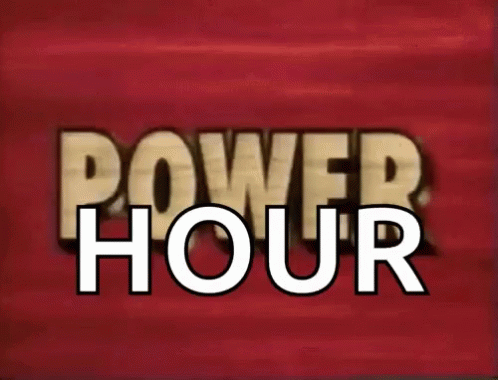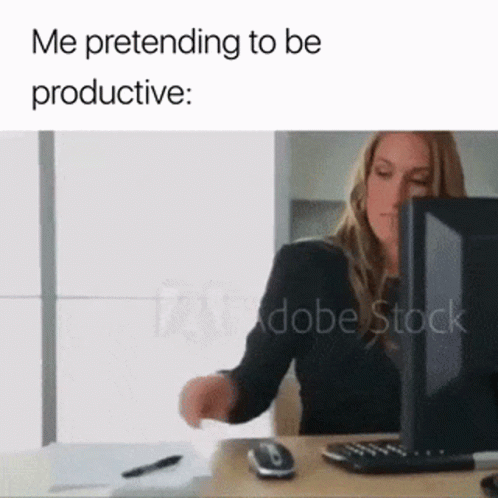In essence, routines are a major part of leading a well planned and structured life. Resulting in far less time thrown down the drain to trivial activities that don't serve you well, namely excessive sleeping, scrolling social media and/or binging Netflix shows.
You insatiable monster. These services have been meticulously engineered to keep you hooked.
By harnessing and manipulating the numerous "pleasure hormone" systems found in the human body, these providers have been able to extract your time for a profit. And I'm sure you've heard it before, your time is your most valuable asset
- I'd say though, that your attention is! The activities you allow to flood you conscious mind are the ones that manifest in your unconscious mind, resulting in your unconscious mind continuing to donate energy to these activities, even when you're not paying focused attention.
That's conscious + unconsciously directed energy - attention is essentially then, time2 (and since time is money, it's also money2)... a bit of "pseudo-maths" to kick things off.

click for: CONTENTS OF ROUTINE
- Preamble
- Benefits
- How to/ Cheat Codes
- Closing
- Interesting Concept
Preamble
I used to lead a life best described as "spontaneous", so I get it, its a fun, liberated lifestyle. Free to do what you like, when you like, how you like and where you like. Life completely on your terms. Seemingly desirable, but its greatest pitfall is it leads to stagnancy and in turn mediocrity.
It does not afford any real way to track your progress. I'd liken it to strength training at the gym. If you're familiar, you'd've probably heard of the term "progressive overload". In short, it is an approach to achieve consistent "gains" 💪 through steady increments of weight and is largely contingent on having a consistent gym routine - you wouldn't get very far if you just showed up to the gym when you felt like it, and did whatever exercise you felt like doing at the time and performed the exercises however you wanted (this is the main trouble for novice gym-goers).
Benefits
Now with a well structured routine in place, you're set up to lead a productive and progressive life, aiding you in attaining that top 1% status that I'm sure you're yearning for.
The top 3 advantages of creating and adhering to a routine are:
- Efficient use of time and energy, leading to improved progress.
- Helps to break from compulsive cycles and create new, advantageous ones.
- Boredom - good way to fill up your time, leading to less boredom.
*Bonus* You always know exactly what to do at any given moment.
Side Note - 24 Hour Breakdown
It all boils down to time! Routines are fundamentally time management systems.
Time is extremely valuable - consider this:
A 24 hour day can be split up into three main 8-hour periods.
If you spend 8 hours sleeping a day, that's a third of your day gone (not wasted though).
This can also be seen as a third of your whole life spent sleeping - hence why I'm the biggest advocate for sleeping less (6 hours a day once you've reached adulthood. That extra 2 hours a day really compounds over as lifetime.)
You've then got to slave away 8 hours at work.
You're left with only 8 hours in your day of free time, which is even still, further eroded by ordinary tasks: eating, cooking, showering, commuting, and so on.
Truly, you have 3/4 active, useful hours in a day which we take for granted. Golden Hours - I'll coin the phrase in this context. These are specifically the hours we allocate to aimlessly browse the web.
You have 4 hours a day.
How to/Cheat Codes
Sleep
Firstly you would divide your 24 hour day into sections as described above. Figure out a suitable bed time - your day starts from the night before! Decide how many hours of sleep is appropriate for you, you may need to experiment with this! (sleep is a complex topic we'll pick up another day).

This will lead to the time you wake up. Now, although I am an early riser and I do my best work in the early hours of the day, I appreciate that not everyone is the same and so you must find what works best for you. There are just as many successful individuals that wake up at 4am as there are that rise at noon. What matters here is you use the remaining hours of the day effectively.
Once you're up, you can do your lil morning routine, make your first coffee, say a prayer, or whatever gets you going. After this, you must make a to-do list for the day (some may prefer doing this the night before). It helps in setting your intentions for the day and keeping you accountable. See it as a little pocket guide for your day. Read Making To-Do Lists. The things you add to your lists will/should mainly align with your goals. You could create micro-habits that you do every single day that contribute to a particular goal, for example: a minimum of two lessons on Duolingo a day. You could see how over 6 months or even a year this would help in progressively learning a language.
Next, your job.
Some may be more fortunate and have the liberty to work from home, aiding in regaining some of that dead time lost to commuting and even ablution (washing oneself).
Or if you are at the stage where you are working on building or growing your own business, especially if it's one you're passionate about, this 8 hour block can be considered as less of a burn of time.
But, for the more general example of workers who are subscribed to the 9-5 route (or night shifts), this time is sunk to building someone else's dream/business. This is not necessarily a negative however, working a job can be a means to an end and used as a stepping stone to propel you to your goals. Even for the aspiring entrepreneurs, as it is said "before you can lead, you must first learn to follow". There are many other benefits to working a job, namely: learning soft and transferable skills, building a career and obviously earning an income for your livelihood.
Golden Hours

The time you wake up will determine where these treasured pockets of spaces are found and how these "Golden Hours" are spread throughout the day. E.g. early risers will work in the early mornings before departing for their jobs and then a little more once they return... *5-9 then 9-5 then 5-9*. Their "Golden Hours" are sandwiched before and after their work day. Meanwhile, late risers will primarily work in one big chunk after their jobs into the late night... * 9-5 then 5-2* - you can see how the effects of sleep trickle down into every aspect of the day .
As the word "Golden" implies, these hours are precious and should be cherished. Hours that are to be used to carry out proactive, out of work, work. As captives of the matrix of life, we are subject to and out of control of many factors like our: age, race, parents, residency and so on, thus, we MUST take control of the things we have sovereignty over. The effective use of these hours extraordinarily compounds over an extended period of time. No one will be able to compete, especially those just winging it.
Your time, your attention in these hours should be steered towards things like business, side hustles, gym & health, personal development and even hobbies. Time for other recreational activities can be made but the trick to this is the obsessive accounting of every hour/minute and what you pay your attention to.
The conventional working Monday-Friday 9-5 may not be the case for everyone. For example, an individual may work primarily night shifts. They would have to jig the system around to favour their schedule e.g.:
Work -> Sleep -> Wake -> Plan Day -> Golden Hours -> Work (repeat 5x)
Weekends
The weekends is where it all falls down. Lay ins are a no go... your sleeping pattern should remain the same - it's about consistency. Sleep is largely controlled by hormones and so sleeping in on these two days will affect their regulation making Mondays that much harder to endure. It may feel good in the short term but will affect your weekly cycle.
Provided you are the regular 9-5er, you've got back an extra 8 hours of your day (but also, if you're not, consider your off days here(and if you work 7 days a week, more power to you!!)).
You already know what I'm about to say about these hours :). Do work. (LOL)
Ok, realistically, rest (not particularly sleep) is important too! This time is also to be used for activities that couldn't be handled during the hectic week.
As an example, of a weekend template, you would wake up at your regular time, do your usual morning routine, create an intention for the day with to-do lists as normal then effect your plan. The only difference here is you have a lot more time to play with and you can allow for more down time - I'll allow you one or two Netflix episodes here (aren't I nice?). It is important though that with these extra hours you perform more needle moving activities - goes back to the obsessive accounting of your time and energy.
Cheat Codes
- Use of the commute to work to create and utilise even more time.
- One Thing - To perform at your optimum, you need focus. It becomes hard to focus when you are juggling many things at once. You're spread too thin. Cutting out or possibly parking off some activities for later is ideal. Only focus on a few things and do them well!
- Food, sleep & exercise greatly affect your focus. Hacking and optimising these factors will just make your days flow that much better.
- Don't over achieve at work! Unless you are actively passionate about a career in the specific field. Do your work to a satisfactory standard, minimise stress, and allow your mind to consciously and subconsciously give energy to your business, side hustles and hobbies in any time that you find.

Closing
I know it sounds robotic and difficult - we must do hard things to live the lives we want not the lives we are given. It takes energy to change the trajectory of your life, or really, anything - imagine a ship or a plane or a rolling boulder. In practice you're human and you won't get perfection. Some days will definitely be better than others that's why we must slightly over shoot with our aspirations, dream that much bigger, as the platitude goes: "Aim for the moon. If you miss, you may hit the stars." If 70% of your days are good, it's a big step up from 30-50% and there will be a noticeable difference
When you really get into it, your routine becomes the most important thing to you. You'll begin to spot time sinks and finally say no to activities that don't align with your purpose/wants.
Interesting Concept
I'll leave things here with an interesting concept about Ed Mylett and his 6 hour day. It vividly illustrates the auspicious effects of a routine at a very extreme level.
Control you attention, Control your life



